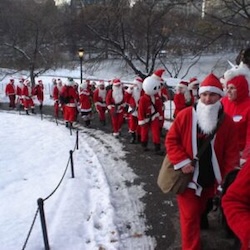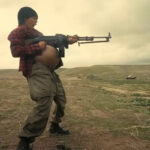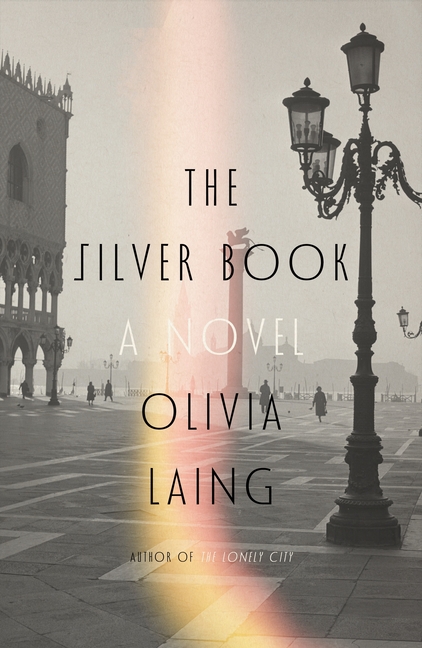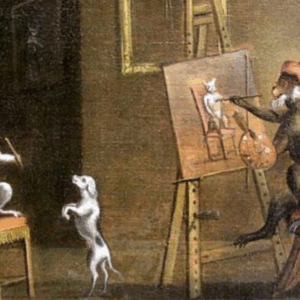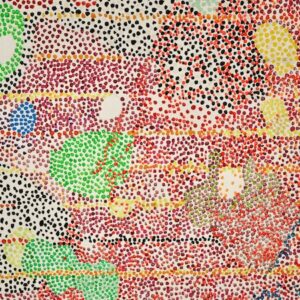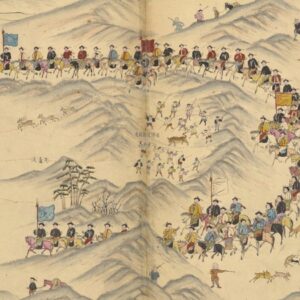
Bang-Whimper: A Story by Jeff VanderMeer
From the Final Issue of Black Clock
Bang-Whimper always said there’s a reset we just can’t see yet, but we’ll get to that mountain real quick. The reset.
Bang-Whimper said we have to believe in the reset for it to work, though. And that’s what worries me. Bang-Whimper said this huge ocean of garbage we’re sitting on top of—it’ll be transformed because we care so much, those of us who are left, all of us haven’t yet been eaten, or are still eating others. That includes some of the rats and the vultures—and the cybernetics. As Ross says, “They ain’t people, but they ain’t meat neither, so we gotta give ‘em the benefit.”
Not to confuse this kingdom, this ocean of garbage, with a garbage-filled ocean—that’s somewhere else. Although more’s the pity there’s not much way to tell the difference.
* * * *
Another thing Bang-Whimper told us because he was always telling us things and no one else was—if we catalogued the nine-billion names of the trash, if we did that right, the planet would take heed, that if we named the enemy like that, the enemy being things, the enemy being things we brought up out of the ground and couldn’t shove back in…then we’d have a chance, show commitment. Not that we aren’t “really fucking committed already” as Ross says. But we’d know something from the names because we lost track along the way, that was our sin (even if we ate the last priest last Sunday).
We lost track. Who could keep track when we were so busy keeping track all the time. Who could lay track out of the trap, so to speak, when the track was part of the trap? Now maybe we can because we’re laid up at the top of this mountain of garbage so now’s the time if ever—it’s right below us. But before who had the time. Everybody had the time if you asked them and no one had the time. I’m gnawing the last burnt flesh off a baby’s arm while I write this and I’m not fucking guilty about it. The baby’s dead and I’m not and I’d like to keep it that way.
* * * *
Bang-Whimper once worked in what Ross calls the silly-con valley. He sure did. Before he was king of the trash heap. Futurist before the future happened.
Down below us there must be at least a million dumb smart phones he helped coerce on the world, and maybe a half a mil skeletons of varying quality, size, and description that were his employees or somebody’s employees. All held together with the new glue: so many thousands of tons of kitty litter that you can’t forget about pets even though those are not cats on this garbage heap. That was protein, and you don’t let protein escape, even if it purrs or looks up at you with its head cocked to the side expecting a treat. Because it’s the treat.
So Bang-Whimper’d lived it, he knew it, he made love to it and he kept it in the public eye, until that eye got plucked out. He was a leader of men, and that’s why we followed him. Because the king pool’s shallow and I sure don’t know how to lead us atop this cat-litter mountain. And Ross sure as hell can’t. Ross is such a chatter box he’s like comic relief but if he had to stand up, we’d all fall down.
We don’t even know as much about this garbage heap as we should—none of us have taken a deep breath, held it, and dived down far enough. There could be some secret society at the bottom, buried there, with their own rules and customs, wondering what the hell is up at the top of the mountain. And all that’s up is us stupid fuckers, frying in the sun. I wonder if they care about sunlight, or if they like it where they are. If it’s quiet and nice and their skin doesn’t burn from chemicals and all the sun destroying us cell by cell. I’d like to meet them someday, these base-dwellers. Ross says he’d like to shake their hands. Or their paws. Or their processors. Be nice to see someone new.
Bang-Whimper said this garbage mountain does have an end, that it hasn’t gone seamless with the other garbage mountains and their leaders, that there’s land between. Maybe not good land. Maybe not land you could grow anything on, but at least not garbage.
But you can’t see land from the top of our garbage mountain. You can’t see it, which would be meaningful. Or as Ross says, “That would mean something.” Even though we’re at such an altitude here that it can make your breath short and shallow, and there’s a chill at night. No. You can’t see the end even with binoculars. So it’s hard to tell where Bang-Whimper’s mountain ends, which means we can’t create borders or patrols or know which of us are with us and which of us are against us.
* * * *
Bang-Whimper told great stories about how the stuff we’d left behind would come back to us in the end. That somewhere in the great garbage morass lay wonders yet to meet us. Like cryogenic frozen heads of famous people that might one day sprout bodies and reawaken and populate the Earth with the bounty of their sacred brains. Like secret intelligent factories deep below the Earth, still churning out products, waiting for the day when we would all turn our garbage mountains into ploughshares and verdant fields and could once again take up our prior responsibilities.
Like, the Earth was truly hollow not just the garbage mountains and in the middle of it we would find not a chewy nougat center but a species of people who would replace us in the really really really remote chance that we were not up to the task of turning our garbage mountains into shiny perfect ploughshares.
These were our opportunities, too many to count—the undead heads, the living industries, the people under the Earth waiting to rise up. We might be desperate now, but the future, Bang-Whimper told us, was a many-colored cloak that shone and glittered and grasped and clawed and in all ways was, as Ross said, “Alive, alive in ways we common shitheads cannot fathom, including the fact we don’t know most of us what fathom means, amen. And this smelly mountain-feastin’ and sucking water from the asses of dead toad ain’t husks yet is just a transition to a point. It is leading us to the point of it all.”
Still, we began the naming Bang-Whimper wanted from us. Me and Ross and a nameless dude and a woman who had a name but wouldn’t tell us and half the time had her gun ready even though we didn’t know if it was loaded or a flare gun or a real gun or a water pistol but none of us wanted to find out and there was better stuff to try to eat anyway. Marginally. The unnamed woman thought she knew the score of things, even though there wasn’t even a scoreboard anymore. Still, that score was 1-0 in her favor, so long as she kept her distance and didn’t talk much to us and helped just a little, and she was probably right anyway.
And there was half a robot but we couldn’t tell if it was help or it was trash, too, so we named him “robot” but let him name things too. We didn’t know where its other half was, but it hadn’t died so you “had to give it points for that” as Ross said. Ross felt the only way to hold onto our past was to preserve its clichés. That he might be the last man alive who knew most or all of the clichés. Every time he said last man alive he would tell us that was a cliché too but he would look at the woman but she wasn’t having any of that and neither were we. We were all sterile as mules. All we could do is repopulate the Earth with the trash we named.
* * * *
When Ross and Bang-Whimper found the robot under a pile of other junk on our garbage mountain, the first thing it said was “Fuck you. Fuck your theories. Fuck you in all the orifices.” So I thought it might be half of a sex robot. But, no, it was just completely self-aware, and it felt good that people had, toward the end, created something intelligent for a change. “Fuck your garbage. Fuck your sun. Fuck fuck fuck.” Everything the robot said was framed in terms of fucking, which in our depleted and sterile and starving state was really truly an abstract notion, only made more so by the robot’s inability to stop talking about it.
Bang-Whimper ordered us to destroy the robot, maybe because it had opinions and he wanted us to only know about his opinions, but we couldn’t destroy the robot and soon gave up and Bang-Whimper forgave us and turned to other matters. The robot was made of something tough. We could hardly dig it from the rubble. All we could do is insult it by defaulting to “he” and pry out his eyes. But still he talked because: vain hope, that he might use his eyes for that. Several times Bang-Whimper asked us to chuck the robot down the mountain, but he was very heavy and as Ross put it, “there are few enough voices up here on top of crap mountain.” We were starving under the hot sun, but as long as we were alive, we would experience boredom in our dying, like sensing a ghost limb from days long past.
At night, when the stars came out and we could pretend in that dark light that the garbage mountain was a mountain of things that functioned, the robot would set a default to his speech as if switched to inactive mode. Looping between “fuck you’s” he would say, “I will outlive you all. I will outlive you all. I will outlive you all.” A lullaby of sorts, the way he said it. Many times we would fall asleep to that soft humming sting, and be glad of it. We all knew he was right.
* * * *
There were so many things right at our feet we almost couldn’t start listing or we might have gone mad, all those things getting stuck in our heads, where they didn’t belong anymore because nothing our brains thought about how to use them or abuse them could be done any more.
I would name these things for you, I truly would, I would embed like a burning truth in the form of a bush I couldn’t put out— because we have no water, just inventive ways of catching dew—the list of the objects in our mountain of crap. But for the sure and certain knowledge that you, too, who read this must be also sitting atop a mountain of garbage, perhaps even the same mountain of garbage. And that thus all you need to do is look at what you’re sitting or standing on. Because that is your list: the list and your mountain and your ass are one and the same thing. That’s the secret of the naming if there is a secret to the naming.
In the naming, you discover that making a list provides no order, serves no purpose, can only ever be a waste confronted by the endless number of things on the list that you are looking at now, and now and now…
But anyway…
I did list more elsewhere, named them, because I lied here, although then it began to seem pointless again, to me and Ross and maybe to the others too. I don’t know. They didn’t talk much. Pointless because the stuff was right there and so obvious and yet so much other stuff beneath it we’d never get to name, would remain unknowable. So in the end we’d be charting the map of the outside skin of a huge mountain of junk and yet the middle remained hollow in our imaginations, like if we tapped on the outside in a certain way it’d be like a metal eggshell with nothing inside—there would be an echo, that if we dug through we’d fall into a cavern and the ultimate answers to everything would be there and we wouldn’t be able to see them, we’d just wander this empty cavern knowing the answers were all around us and nothing we could do about it. And if that was true, our perch was precarious, our mountain precarious, our lives uncertain. What was lie and what was truth and what was bullshit? And which of those was going to save us?
Like I said, going mad can be a hazard out here on top of shit mountain, and one Bang-Whimper was aware of, although as he always said there was no out there to escape to—and that was good. We only ever had “here,” and we had to make “here” work, rebuild “here” and “now.”—there’s only ever here.
And boy is there a lot of stuff here.
* * * *
Our search to name all the stuff in our mountain of garbage always ended at nightfall. Bang-Whimper wasn’t not big on electricity any more, now there wasn’t any. Which Ross says is to be expected. “The lack of a thing has an impact on people’s interest in it, y’all. When it’s scarce, it’s valuable. But when it doesn’t fucking exist no one gives a shit about it anymore. Like faeries and unicorns.” But I don’t know if that’s true. I kind of wish faeries and unicorns were real. Then maybe electricity would be real again, because I think a lot of electricity was given over to talking about unicorns and faeries. But maybe that’s wrong thinking, because maybe more people thought about unicorns and faeries than thought about whales and otters and stuff when they should’ve been. But as Ross says, “That’s magical thinking. Like, if there were magic, that would be classified as thinking. Because right now, in the moment, we’re sitting atop a freakin’ pile of garbage higher than Mount Everest—and Mount Everest is a heap of garbage, too.”
So that also affected what we’d salvage, when we’d salvage, instead of doing naming. We’d bring back cereal boxes and cans and can openers and real books, not their ghosts. You can’t see their ghosts any more for the reasons I just told you. Much as Bang-Whimper is mournful about it. Much as he has his tales about the old days when people only paid for the pages they read and people far remote peered over other people’s shoulders continents away and no one found it creepy as hell.
Now, though, it is sometimes hard to know what people are up to on this garbage mountain and there are not many of us, that we know of.
“You’re a bunch of fucking idiots,” the robot keeps telling us. “When the aliens come down and find me and your bones, that’s all they’ll be talking about. That’s all they’ll say about you. These bones were fucking idiots. This robot is a genius but they never listened to him because first they thought he was a sex robot and then they thought he was just half a fucking robot. And who listens to half of anything, you shitheads.” There was more, but it got so repetitive, my wrist would hurt setting it all out.
I thought in naming the garbage, in getting to know the garbage again, that I might find things I missed from before. That I’d remember stuff in my life or that some toaster or paperweight or wine bottle or garden hose or detergent or remote control or dinner plate or walking stick or tire or dashboard or CD or iron or distributor cap or piece of luggage or rotted human head with the eyes and tongue gone… would conjure up a past I’d like to return to. I really did—and so did Ross, if he was honest, and he was not honest. But none of it did because all of the moments ran together like burnt butter in a hot pan and I couldn’t seem to pick enough out individual to make things stay put so they could do that to me, and maybe that meant I didn’t ever want that done to me, that Ross didn’t want that done to him—that that would be like merciless aliens coming down and probing us.
“Besides, we got it all now,” Ross said once. “We got any and every goddamn thing we ever could want—all in this fuckin’ pile right below our warm asses. We’re like a coupla hens incubatin’ our eggs!”
That was the worst Ross ever got, because it wasn’t cool to mention eggs or hens when those were rare as dodos now, and I took it to happen because he was high on stuff you don’t ever want to know about that he’d jury-rigged from other kinds of stuff you’d not wish a dog to sniff with gusto let alone a human. Some kinds of the trash in here would drive you insane if you let it, so you smoke it instead. Rancid. Fleshy.
At first I wished we could smoke the robot, too, but I didn’t mind him after a while. I got used to him. I thought of him as the court jester there in our kingdom of garbage. I thought of him as a kind of nasty comic relief, and we’d not had much of that for months and months.
“Fuck your dead babies and your garbage and your pretentiousness and the way your brains don’t work right and never worked right and that’s why I’m here right now, cast up on this garbage heap instead of doing something important or even something I might enjoy.”
“What would you enjoy?” I asked the robot.
“I don’t fucking know. But it’s not this.”
“Then why not be silent?” I asked.
But he couldn’t be silent, because he didn’t enjoy silence.
* * * *
I named myself right in the middle of all that other naming, because I wasn’t ever going to be the climax of anything and thus I didn’t want to wait too long. I named myself in the middle in case I died before I finished naming all the rest. Then at least Bang-Whimper might remember who I was before I became flesh and then trash. All those things below me but not beneath me.
It happened too because of this green shoot I found alone around mid-heap. I saw it, I identified it as good and I plucked it and I ate it, along with the big perched bug upon that stalk and I didn’t care if I was found out for it and called a shitty selfish forager. It was the sweetest meal on the whole planet and to a year or more to either side as well.
The green was the most intense green I’d ever had in my mouth, cut me sweet like the edge was against my eye not my mouth, and the taste so strong and the bug was like an iridescent gem filled with heaven and even the crunch of its carapace was the kind of bliss that doesn’t exist on a garbage heap.
But that moment I turned rogue over a stalk, I re-christened myself, too. I said to the metal and glass and filth, “My name is Whimper-Bang,” and from that moment in the middle of it all I knew that Bang-Whimper’s days were numbered and that he had to go. And he had to go really far away, out of his skull gone. Because in the naming of all of the shit on that shit heap, I knew he’d gotten it wrong ways around and his name was just the half of it. His dull donner name that promised so much up front and then failed to deliver or even get take out just mumbled about take-aways. A Bang-Whimper was always headed down the pile. Could give us words and tales that the old days could be brought back as new days. But in the middle of all that crap and junk and broken stuff, I knew nothing was coming back. Nothing at all.
The woman with the name she wouldn’t share didn’t care what I did after that, so long as I left her alone. Ross was too stuck in some homely that he’d over-extended to react in time. No half-robot ever stopped an able body like me, even had its lasers for eyes still worked. The vultures actually applauded—or circled better for a while, at least.
“They’re doing what they’ve always done—tried to survive, and they’re better adapted to it than you,” the robot said. “They can fly. You can’t fly. You can just sit here in the fucking heat and take shits and sip water out of blood that hasn’t dried and do all kinds of disgusting things no one ever would want to do if you were actually intelligent you stupid fuckers.”
And maybe I did what I did it was because while the robot spoke some kind of truth, Bang-Whimper had just said too much that the mountains of trash he ruled refuted. That the trash was the truth and Bang-Whimper was made out of blood and temporary, fading lies. And, maybe, Bang-Whimper had sent us out to name the things in the garbage because he was tired of pretending and knew what would happen and just wanted it to end.
But in the end, too, survival instincts and reptile brains kicked in, and though I got in a mortal wound right off the bat—I mean, right off the end of the bat, a double headed for home and there wasn’t much Bang in him then, but just a whole lot of Whimper, he kicked out reflexive as a lizard tail and punched blind and only then, bled out with all the others he’d bled out on that pile, and so few others—us—just watching still, looking to our own security first.
Which is when, in an odd way, as I lowered the bat that once some kid had swung to hit a ball with a tinny echo and some other kid had run to catch that bat-hit ball in some long ago ancient outfield that maybe never even fucking existed…which is why I knew the role of Whimper-Bang, too, was a fraud and a joke and a punchline and anything I’d built up as an idea of my realm, my mountain of trash, faded away in the very moment of my ascension, and I dropped the bat and I said unto Ross and the robot and the unnamed woman the only things I knew to be true, and even they weren’t really true anymore. It all sounded less like confession than something remote and insubstantial and hadn’t been real even at the time, like nothing at all, like nothing at all, even though it was my rank and serial number.
“My name before was Larry. I sold sporting goods. I owned two stores in Columbus, Ohio. I liked a team called the Buckeyes for no good reason and I sold a lot of their jerseys. I had two kids, a daughter and a son. I had a wife, who sold real estate. We lived in a community called Worthington that some cynics called Doilyville, and who even remembers what a doily is anymore. But it was nice. I kept my lawn mowed, didn’t use too much water. I got to see my oldest, my daughter, graduate from college. Then everything went to hell really fast and I ended up here, alone, raving like a lunatic, and there’s nothing I can do about it.”
Then there was a pause between the three about to judge me. And praise the fucking God who does not exist yet powers the ever-blazing sun that they did not kill me and eat me. Instead, they stripped the Bang from my name so that I am only ever Whimper and together we sat down to a meal of the one I had half-killed and who could still talk to us but we weren’t listening. He tasted almost as good as a blade of grass with a one last bug clinging to it. Yes, he did.
And Ross said, “Finger-licking good. Heart of stone, but flanks o’ meat.”
And the half-robot said, “No one will ever fucking forgive you.”
And the woman finally spoke, and she said unto us, “That’s not true. I won’t blame you if you won’t blame me. And I won’t kill you if you don’t kill me.”
Everything after was just the tail end of a whimper, but at least we knew that. For sure. For a little while.
This story first appeared in Black Clock magazine. Reprinted with permission of the author.
Jeff VanderMeer
Jeff VanderMeer is the New York Times bestselling author of more than 20 books including novels and fiction anthologies. He has won the Nebula Award, the British Fantasy Award, and, three times, the World Fantasy Award and has been a finalist for the Hugo Award. He is the cofounder and assistant director of Shared Worlds, a unique fantasy and science fiction writing camp for teenagers. He lives in Tallahassee, Florida.









